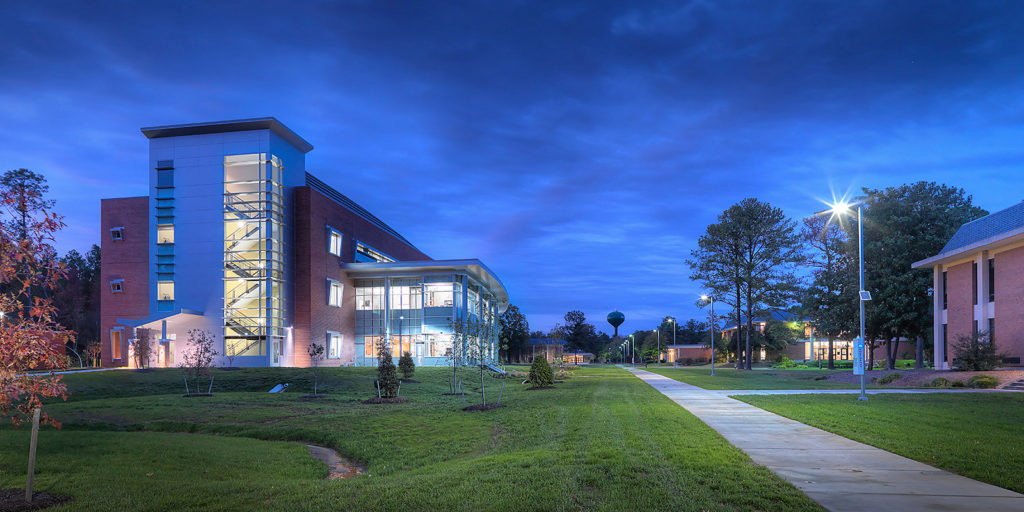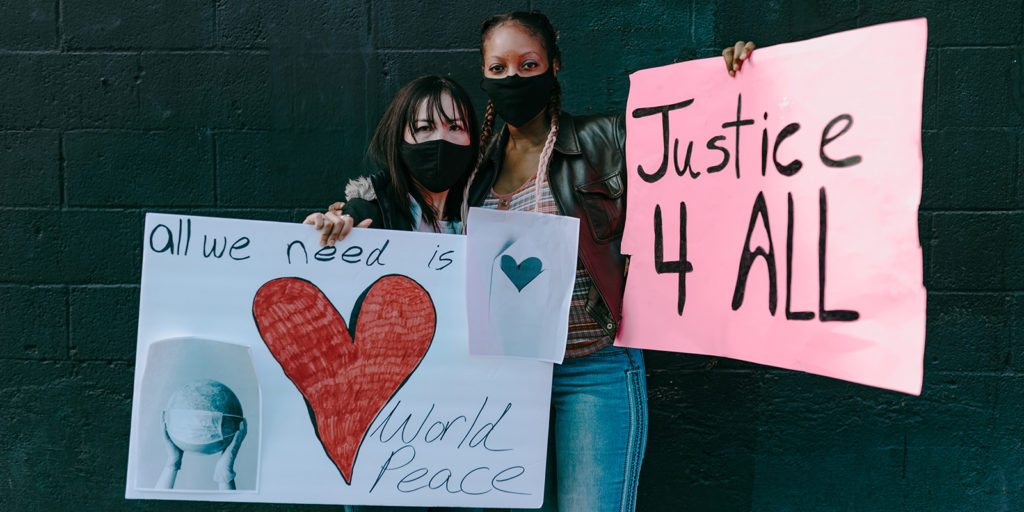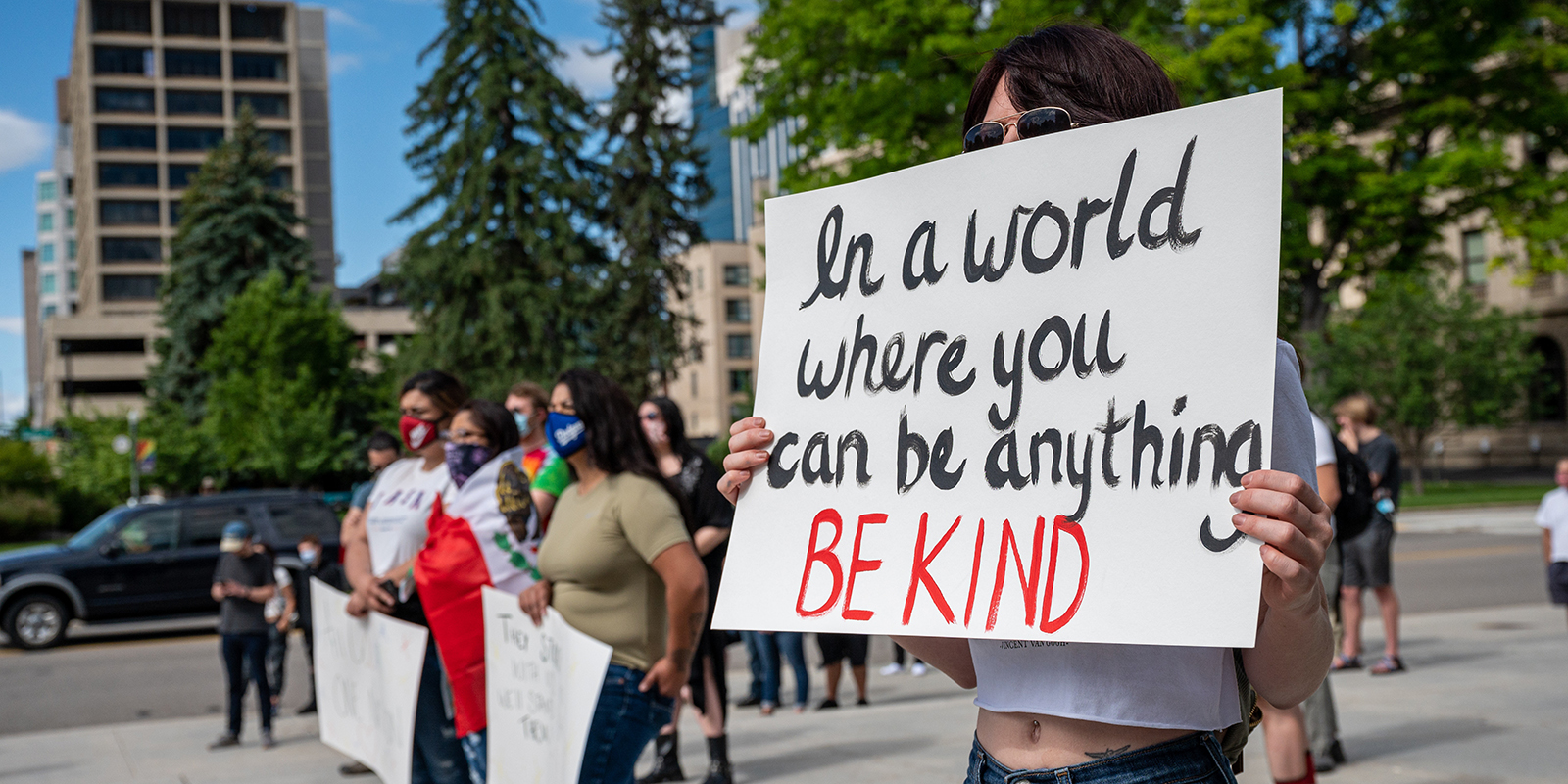Task Force History
Introduction
On July 9, 2020, Dr. Debbie Sydow, President of Richard Bland College, assembled a group of campus and community leaders to form a Task Force on Racial Justice & Equity (RJ&E). Dr. Sydow appointed Professor Thomas Addington and Dr. Evanda Watts-Martinez as Co-Chairs to lead the charge to identify, confront, and alleviate racism and discrimination on the Richard Bland College campus. With the continued oppression of (and acts of hatred against) African Americans and communities of color weighing heavily on our hearts and minds, the RJ&E Task Force has been established in alignment with Dr. Sydow’s vision for the operations at Richard Bland College to be based in equity, inclusion, and achievement in accordance with the stated values of the Richard Bland College 2020-2025 Strategic Plan.


A Call to Action
Inclusiveness – a core value of the RBC Strategic Plan – will position the College to realize its goals, and in this vein, the Racial Justice & Equity Task Force will develop action steps to move the College toward realizing its greatest potential as a multicultural, anti-racist, and inclusive institution. These goals as outlined in the 2020-2025 Strategic Plan are: to provide a family-friendly learning environment which offers enthusiastic, student-focused services that embrace campus diversity; and to instill positive leadership values through impactful initiatives and resources that lead to meaningful, transformative outcomes for members of the campus community.

The revolutionary action steps and approaches suggested by the Racial Justice & Equity Task Force will enable Richard Bland College to achieve systemic transformation. This transformation will inspire actions that combat the entrenched discriminatory policies and practices that reinforce the educational, structural, and social inequities experienced by students and employees of color. These inequities disempower campus community members of color, placing them in adverse conditions in which education and professional advancement seem unattainable.
Accounting for Our History
The work of this task force emerges from and seeks to address the complex history of Richard Bland College as well as its namesake, the early American statesman Richard Bland. While playing a key role in the forming of our nation – including putatively authoring the phrase “taxation without representation” – Bland also enslaved men and women on his plantation, Jordan’s Point, which would become the site of the College. While Richard Bland College prides itself as a family for its community members, its founding was based in exclusion as an option for White students who wanted to continue their education at a predominately White two-year college. These aspects of the College’s history among others enabled the leadership of Richard Bland College to understand that an authentic transformation can only begin after an honest accounting with the College’s past.
The Racial Justice & Equity Task Force Vision
The Co-Chairs of the Racial Justice & Equity Task Force reviewed President Sydow’s charges and began to reflect on issues of equity and persistent racism at all levels on campus. They considered her request as a call to action on the campus of Richard Bland College of William & Mary. As a result, the co-chairs started outlining a plan for the RJ&E Task Force and started a formal exploration of inequality within the systems and structures that have impeded the educational, professional, and social mobility of students and employees of color within the campus community.
The task force recognizes multiple inequities – representational and otherwise – on the campus of Richard Bland College. A reconciliation with the College’s history and an acknowledgment of how that history impacts its present, however, has not yet been undertaken. The task force leadership sees our present moment enflamed by racist injustice as an opportune one to initiate this reconciliation through potentially uncomfortable, complicated, but necessary dialogue among all campus community members. This necessary reconciliation will provide a basis (buttressed by data) from which to cultivate a more equitable and inclusive college.
To that end, the Racial Justice & Equity Task Force will explore the persistent inequities and lack of inclusiveness that have been carried out within each College department’s policies, procedures, and structures. With students as RBC’s priority, it is necessary to examine whether learners of color feel equitably supported in the classroom and in their experiences of accessing and receiving academic support services. In consideration of these concerns, it is important to determine the impact on the retention and achievement of students of color these inequities undoubtedly have.
Guiding Questions
The Racial Justice & Equity Task Force will consider guiding questions in developing and submitting final recommendations to President Sydow and the President’s Council. Guiding the task force’s work are inquiries based on the stated values of the Richard Bland College 2020-2025 Strategic Plan, which presents an institutional outlook that stands in opposition to exclusion through its appreciation of the power of diversity and individual difference. The overarching questions leading the work of members of the Racial Justice & Equity Task Force include:
- How have equity and inclusion been fostered in the structures, systems, policies, and procedures within and across departments on the Richard Bland College campus?
- If nurturing students’ potential demonstrates enthusiastic, student-focused service, how are retention and achievement of students of color impacted on RBC’s richly diverse campus, in which a disproportionate number of employees represent their race and culture?
- What are the appropriate steps to build an anti-racist learning and working environment in which equity and inclusion serve as core values that inform and inspire Richard Bland College’s transformation into a multi-cultural, student-centric, and family-friendly campus?
Phases of Action Timeline and Committee Charges
The work of the RJ&E Task Force is organized in seven phases:
[["PHASE","CHARGE","DESCRIPTION"],["Phase 1","Exploratory","Examining policies, procedures, and practices"],["Phase 2","Planning","Sequencing actions steps toward RJ&E Task Force’s goals in all phases"],["Phase 3","Implementation /Monitoring","Focused execution and observation of RJ&E initiatives and program adjustments made as needed"],["Phase 4","Assessment","Evaluating progress linked to program execution"],["Phase 5","Administrative Review","Submission of drafts to campus leaders for review"],["Phase 6","Final Draft Updates","Adjust documents based on the feedback from campus leaders"],["Phase 7","Submission of Final Report",""],[null,null,null]]Charges Organized by Phase:
- Conduct an honest assessment of Richard Bland College’s historical record as it pertains to racial inequality in higher education in Virginia in order to unpack those elements of oppression and privilege that have influenced its trajectory, and to chart a new course forward. (Phase 1: Exploratory)
- Generate a vision statement that outlines concrete actions to be taken, and an assessment plan, to ensure that the institution conforms to its articulated anti-racist, multicultural identity. (Phases 2-5: Planning, Implementation/Monitoring, Assessment, and Review)
- Publicly articulate Richard Bland College’s identity as a multicultural institution committed to anti-racist organizational development and commit to perpetual, periodic training and evaluations of how the faculty, staff, and administration are progressing toward the manifestation of this identity. (Phases 4-7: Assessment, Review, and Final Submission)
- Evaluate policing on Richard Bland College’s campus to identify and, as needed, rectify policies and practices related to accountability, racial bias, and use of force that do not align with RBC’s articulated anti-racist, multicultural identity and Vision Statement. (Phases 1-2: Exploratory & Planning)
- Enlist outside experts on diversity and inclusion to provide training for faculty, staff, and administrators. (Phases 2-7): Long-term Planning, Implementation/Monitoring, Assessment, Review, and Submission)
- Establish relevant, long-term service learning activities in Petersburg and surrounding communities of color. (Phases 2-7): Long-term Planning Implementation/Monitoring, and Submission)
- Take steps to make the faculty, staff, and administrators more racially and ethnically representative of the communities they serve. (Phases 2-7): Long-term Planning, Implementation, and Submission)
Ideal Outcomes
At the end of the Task Force’s work, Richard Bland College ideally will have:
- People of color representing 50% of all the College’s functional units – especially in middle to upper-level leadership ranks – to be more representative of the students we serve.
- An infrastructure of high-impact equitable support for students of color that positively affects their retention, achievement, progression, and degree attainment.
- A culturally-competent and inclusive community dedicated to eliminating all forms of discrimination including racism, classism, sexism, heterosexism, and ableism.
- A transparent, participatory budget that equitably allocates resources to fund programs, initiatives, and outlets that support communities of color on campus.

Questions regarding the RJ&E Task Force plan may be directed to the Co-Chairs of the committee at racialjustice@rbc.edu